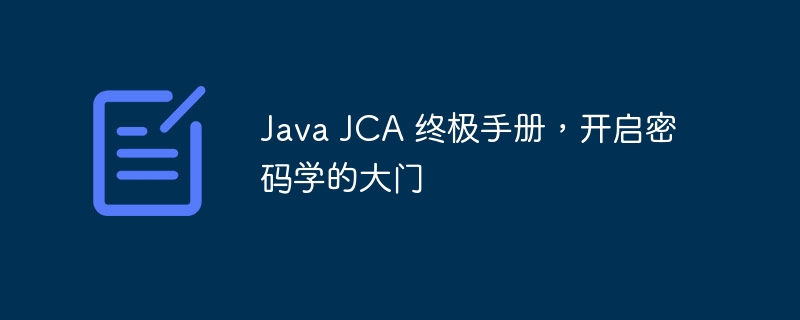Java JCA ultimate manual, opening the door to cryptography

Java JCA (Java Cryptography Architecture) is a cryptography programming interface provided by Java, covering encryption, decryption, digital signatures, message digests and other functions. PHP editor Youzi brings you "Java JCA Ultimate Manual, Opening the Door to Cryptozoology", which introduces in detail the use of Java JCA, solutions to common problems and practical case analysis, helping you to deeply understand cryptography knowledge and improve Java programming skills. . Learn now and open up a new world of cryptography!
- Provider: Provides implementations of specific algorithms and services. Java provides several built-in providers, including SunPKCS11 and BC.
- Algorithms: Algorithms implemented by the provider, such as AES, RSA, and SHA-256.
- Conversion: Combine algorithms to perform complex operations such as encryption and decryption, signing, and verifying signatures.
encryption JCA provides full support for symmetric and asymmetric encryption. For symmetric encryption, algorithms such as AES, DES, and Blowfish can be used. For asymmetric encryption, JCA supports algorithms such as RSA, DSA, and ECC.
Hash A hash function is used to create a unique identifier for a message. JCA provides several hashing algorithms, including SHA-256, SHA-512, and MD5.
sign Signatures are used to verify the authenticity and integrity of messages. JCA supports digital signatures using algorithms such as RSA, DSA, and ECC.
Key Management JCA provides key management capabilities, including key generation, storage, and management. It works with Java Keystore (JKS) to Securely store private and public keys.
Best Practices When using JCA, it is important to follow the following best practices:
- Use strong algorithms: Choose algorithms that comply with industry standards and have sufficient security strength.
- Manage keys properly: Protect private keys from unauthorized access and rotate keys regularly.
- Use a secure random number generator: Ensure that the algorithm uses unpredictable random numbers.
- Validate input: Verify the validity and integrity of user input to prevent attacks.
- Handling Exceptions: Capture and correctly handle exceptions in cryptographic operations.
Advanced Theme For advanced users, JCA offers the following advanced topics:
- Elliptic Curve Cryptography (ECC): An encryption algorithm with shorter key lengths and stronger security.
- Advanced Encryption Standard (AES): Widely used algorithm for symmetric encryption, offering a variety of key lengths and modes.
- PKCS#11: Standardized interface for accessing and managing Hardware Security Modules (HSMs).
- Custom Providers: Develop custom providers to implement new algorithms or enhance existing algorithms.
Conclusion Java Cryptozoology Architecture (JCA) is a powerful and comprehensive api for cryptography in the Java platform. By following best practices and exploring its advanced features, developers can create highly secure applications that protect user data and privacy.
The above is the detailed content of Java JCA ultimate manual, opening the door to cryptography. For more information, please follow other related articles on the PHP Chinese website!

Hot AI Tools

Undresser.AI Undress
AI-powered app for creating realistic nude photos

AI Clothes Remover
Online AI tool for removing clothes from photos.

Undress AI Tool
Undress images for free

Clothoff.io
AI clothes remover

AI Hentai Generator
Generate AI Hentai for free.

Hot Article

Hot Tools

Notepad++7.3.1
Easy-to-use and free code editor

SublimeText3 Chinese version
Chinese version, very easy to use

Zend Studio 13.0.1
Powerful PHP integrated development environment

Dreamweaver CS6
Visual web development tools

SublimeText3 Mac version
God-level code editing software (SublimeText3)

Hot Topics
 1385
1385
 52
52


